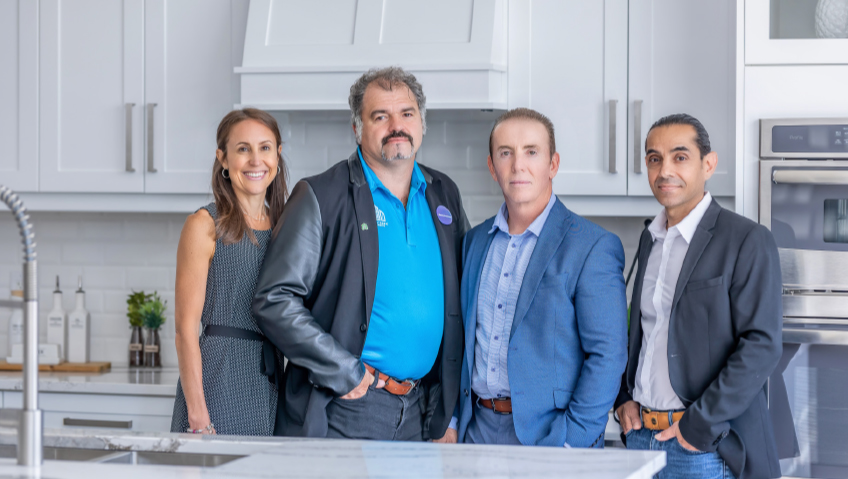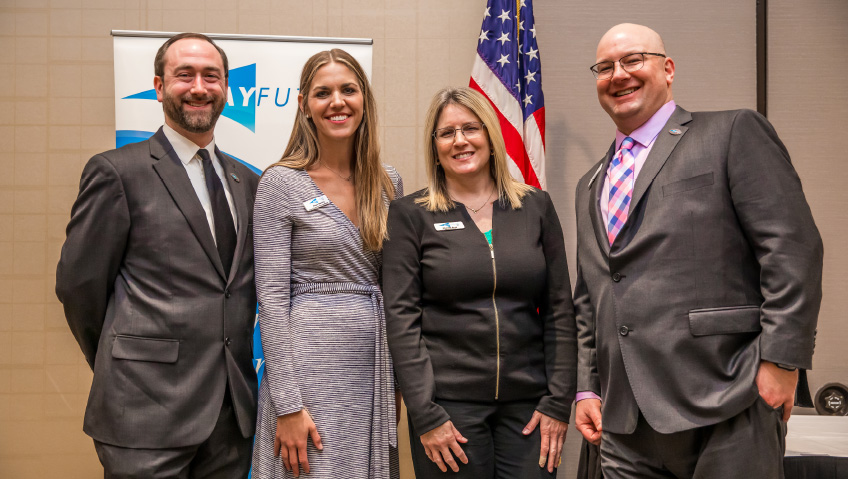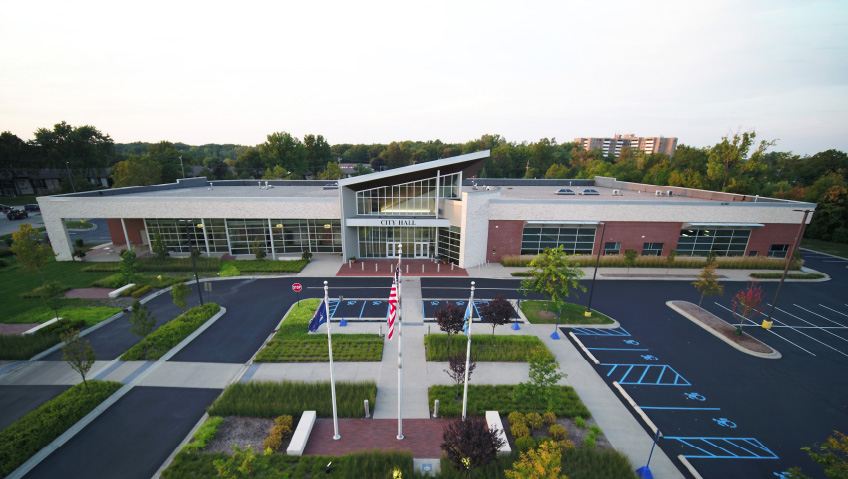Recognized as a leader in innovation in new home construction and neighbourhood growth, Huron Creek Developments has over 80 years of combined building expertise and has delivered more than 10,000 new homes to neighbourhoods over the past 20 years. In both its current and future communities, Huron Creek strives to give its homeowners outstanding value and a top-notch building experience.
The company consistently ensures quality assurance and homeowner satisfaction by collaborating with skilled, certified tradespeople and competent industry partners. The team also employs effective software solutions to offer rental property management services to landlords, whether with a single property or a portfolio of properties.
Huron Creek’s expertise also extends to the development of rental income units and condos for sale, as well as project management services for private clients wishing to build their ideal homes. The company maintains longstanding ties with a number of regional and national organizations and programs including the WRHBA, OHBA, Tarion, and Energy Star.
“I started with my partner Peter Catana almost 25 years ago now, when he was building around 40 to 50 homes a year at EastForest Homes Ltd.,” says Vice President Rick Martins. “At that time, during our best year we built 923 homes. When you’re growing, you only do that one way—by learning and trying to get better and surrounding yourself with good people.”
Together with Catana, Martins started building a family business, and while it continued to grow quite a bit and developed its own policies, procedures, and standards, it wasn’t a company beholden to shareholders, he says. There was the owner, and then there were the people in charge of doing what they were doing. This allowed for a lot of flexibility in learning, innovating, and continually coming up with new ideas.
“Peter’s vision was always one of, how can I provide something that I wanted when I came to this country?” Martins says. “My parents, for instance, were first-generation. They wanted the Canadian dream: a home, education for their kids, and a better life.”
Together with Peter at EastForest, the team built close to 16,000 units together, with the majority of them being products for first-time homebuyers, dwellings that have changed drastically over the years. “When I started with Peter, the first-time home product was a townhome, and at that time a townhome was $99,000 and a single [detached] was about $139,000,” Martins shares. “Today, a townhome is $800,000 and a single is a million.”
While townhomes weren’t considered viable products back then, over time they became both desirable and affordable, particularly for first-time buyers searching in the $300,000 to $350,000 range. For those having a hard time with that price, Huron Creek came up with a new product called the Quad—a semi-detached house with a finished basement, with a unit in the upper storeys and a separate unit in the basement—essentially four units housed inside what traditionally would be only two semis.
“When we started that, I think the first ones we sold were $90,000 for the basement units. Then when the Quad started to get into that $350,000 mark, we had to reinvent the wheel again, and we started building stack townhomes,” Martins explains. “Unfortunately, now, as much as we reinvent the wheel, land cost is so expensive that a starter dwelling—not a single-family home, but an apartment-style dwelling with its own entryway—is over $500,000.”
Throughout the 25 years they’ve been together, this kind of reinvention has been key, says Martins. For this company, getting better means that the company grows and evolves alongside the community, with the homeowners ultimately receiving a better product in a better neighbourhood.
To be sure, doing better is the name of the game. “We are always looking at energy efficiency as well; environmentally, how can we do things differently, better, smarter, with less material and a better product? It was always ingrained in us; it was innate,” says Martins. Reinvention has also meant taking a closer look at accessibility and age-friendly living, greater efficiency from an affordability standpoint, and helping to lower monthly bills for occupants.
“When you’re working with people who are like-minded, such as the staff here and we as owners, we’ve always been about, ‘how can we be better and do better?’ If you can achieve that, everybody wins. We’ve gotten better over the years, because when you’re building something, you always learn,” he says.
Martins is particularly proud of Westwood Village’s second phase in Cambridge, Ontario, which is going Net Zero Ready with the goal of all singles—about 65—to be fully Net Zero. The company is also building 144 Net Zero stack townhomes which will be affordable units through a CMHC program in the City of Kitchener. These homes will contain a dual-fuel system with tankless systems for gas and heat pumps in the units handling the air conditioning. Depending on the price of electricity or gas, a mechanism will change out to use the most affordable heat source.
“We’re always looking at doing something different,” Martins says. “We’re probably the first builder in southwestern Ontario, if not in Ontario, to adopt the AeroBarrier, a sealant product that we apply just after we’re done drywall in our homes that gets into all those little cracks and crevices and takes airtightness to under one, which is extremely tight.”
Another example is that, where Huron Creek used to use HRVs (heat recovery ventilation) because they were more common, the team now uses ERVs (energy recovery ventilation), as they’ve come to understand over the years that ERVs are much better in the sense that they will also condition the air. And while customers appreciate these details, Martins adds, at the end of the day, buyers today are most concerned about affordability.
“We’re at a crucial turning point,” he emphasizes. “Housing [costs are] probably at their peak due to taxation that we have and due to the land supply shortages. Homelessness is at an all-time high, housing affordability is out of reach, and then inflation is where it is. Our leaders need to say, ‘enough is enough.’ They also need to curtail our banks, because they’re making money hand over fist,” Martins says. “One simple fix is removing HST on new housing, and I understand the HST is a tax and it’s revenue that comes into the government, but they can easily remove HST on new housing and replace it with a flat tax across all housing.”
Short of the $24,000 that the provincial government gives in Ontario, there is no other rebate, he says, which means when Huron Creek builds a new home, it’s 12 percent more expensive. “Every time I build a new home, or someone else builds a new home, you’re technically inflating the price of housing, and like I said, there are simple solutions.”
Until these solutions take hold, however, availability and affordability will remain out of reach for many, particularly younger people who will end up living at home or making other, less desirable arrangements for their futures.
“Basically they’re going to have to cohabitate,” Martins says. “But I also say that community has to shift too; when my parents came over [to Canada], we lived with my aunt and uncle in their home and they had six kids and we made do. We’ve been a society of consumption, and truthfully, we have to take a look at some of those aspects as well.”
Other challenges facing the industry include labour shortages, particularly in the skilled trades, and the team at Huron Creek believes it’s important to encourage people of all ages and backgrounds to look into this rewarding career—whether young people still in school or those looking to make a career change. Martins himself went through university to be a teacher, and now runs a successful construction company. It’s that ability to pivot—a valuable skill he learned from his father—that has led to his ongoing success.
“You have to be able to contribute,” he says. “Young people were sold a different bill of goods, being told to go to university, and while it was a great experience for me, it cost me $40,000.”
Conversely, the construction industry—while facing its share of challenges—is one that Martins has succeeded in thanks to taking advantage of opportunities and working hard. There are still concerns to be addressed, however.
“Our systems are really broken, and they need to be fixed,” he says. “I’m okay with unions, and we actually use union trades and union companies, but I’m an open shop, and I really believe in the bidding system. People should be given an opportunity, and it has to be open and fair.” Shortages will continue to keep housing unreachable, he adds, and some union restrictions could make the issue worse as strikes are limiting who can and cannot bid work.
In the meantime, Huron Creek will continue to grow, learn, and find better ways to achieve the best products for its clients and provide the best working environment for its employees and its contractors.
“What sets us apart is our staff, our trades, and the family atmosphere,” Martins says. “Our company is all about family.”
As an example, anyone who gets married at the company receives a $500 cash bonus, while $500 is given for the birth or adoption of a child. Any employee with the company for two years or longer is eligible to receive a minimum $30,000 discount off the purchase of a Huron Creek home. “We were given a lot of opportunities, and while we worked for those opportunities, we were able to get ahead. And now we can give back,” says Martins.
“We’re always learning and always trying to be better. As long as you do that, you end up, I think, at the right place.”






